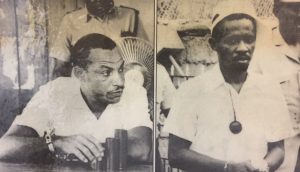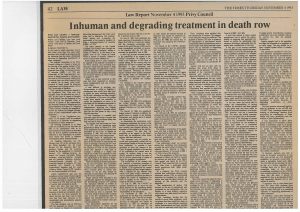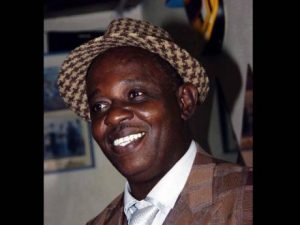Earl Pratt and Ivan Morgan
Earl Pratt and Ivan Morgan both spent 14 years on death row awaiting execution in Jamaica. In recognition of the extreme mental anguish death row prisoners are subject to, their case established a legal precedent limiting the amount of time a person can be kept under sentence of death. Hundreds of people across the Caribbean have been saved from execution as a result.
Earl and Ivan’s story
Earl Pratt and Ivan Morgan were arrested on suspicion of murder in 1977. At their trial, the prosecution relied on the evidence of a single eyewitness and the jury only took two minutes to convict. The pair were sentenced to the death penalty, which was mandatory at the time.
Earl and Ivan were kept in virtual isolation, confined to separate cells measuring six feet by six feet cells for 23 hours a day. There was no furniture. A sheet of foam acted as bedding and the toilet consisted of a bucket emptied once a day.
Mental torment
During their 14 years on death row, Earl and Ivan were handed their death warrants on three different occasions, only to be granted a reprieve at the last minute. One time a reprieve was granted 45 minutes prior to their scheduled execution. The pair were subjected to the mental trauma of being weighed and measured for coffins in preparation for their execution. Earl has described the experience of listening to the hangman make practice drops in preparation for his execution.
The Death Penalty Project assisted the pair’s legal team in appealing their death sentences to the Judicial Committee of the Privy Council in London. Given the severe mental torment inflicted on the men during their prolonged period on death row, known as “death row syndrome” or “death row phenomenon” we argued that their death sentences could no longer be deemed constitutional.
Of my 30 years in prison, my worst moment was the first of three times that I was taken to the condemn cell to face the gallows. They came and weighed me to determine how much weight to put on the gallows for me to hang.
Legal precedent established
In its judgment delivered November 1993, the Privy Council ruled that a period of more than five years’ delay in carrying out a death sentence constituted cruel and inhuman punishment, and therefore violated Jamaica’s constitution. In reaching its conclusion the court referenced the historical context of the death penalty sentencing system inherited from the UK, where executions would be carried out speedily after sentence. The court accepted that death row syndrome was therefore a modern phenomenon which subjected the prisoner to an unintended extra element of punishment. Earl and Ivan had been sentenced to death, not death plus years of mental torment on death row.
As a result of the judgment, Earl and Ivan were removed from death row and their death sentences were commuted to life imprisonment. While Earl was released in 2007 after he became eligible for parole, Ivan never saw his freedom as he tragically died in prison of natural causes three years after the judgment.

Case Timeline
-
Earl and Ivan are sentenced to death
-
Executions resume in Jamaica following an 18 month suspension pending the outcome of a parliamentary inquiry
-
A petition on behalf of the men is brought before the UN Human Rights Committee (UNHRC)
-
Earl and Ivan are handed their death warrant – stay is granted 45 minutes before execution
-
UNHRC finds a violation of the International Covenant on Civil and Political Rights and Optional Protocol
-
Second stay of execution granted following UNHRC decision
-
Third stay of execution granted
-
JCPC delivers its judgment – delay on death row found unconstitutional
-
Ivan dies in prison of natural causes
-
Earl granted parole and released



















